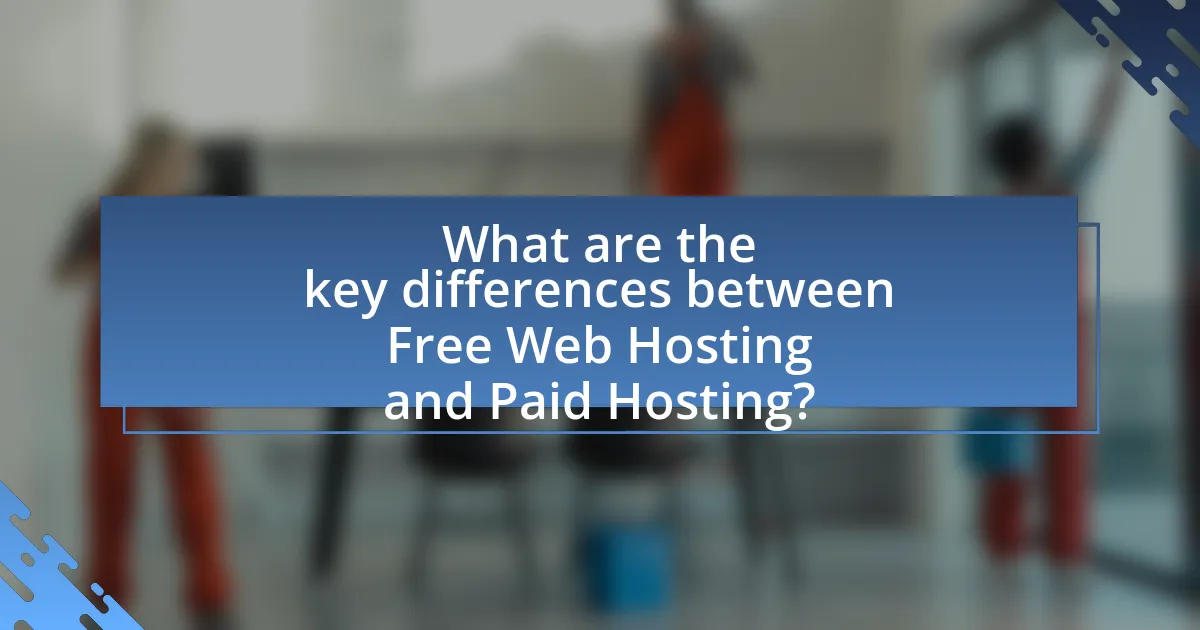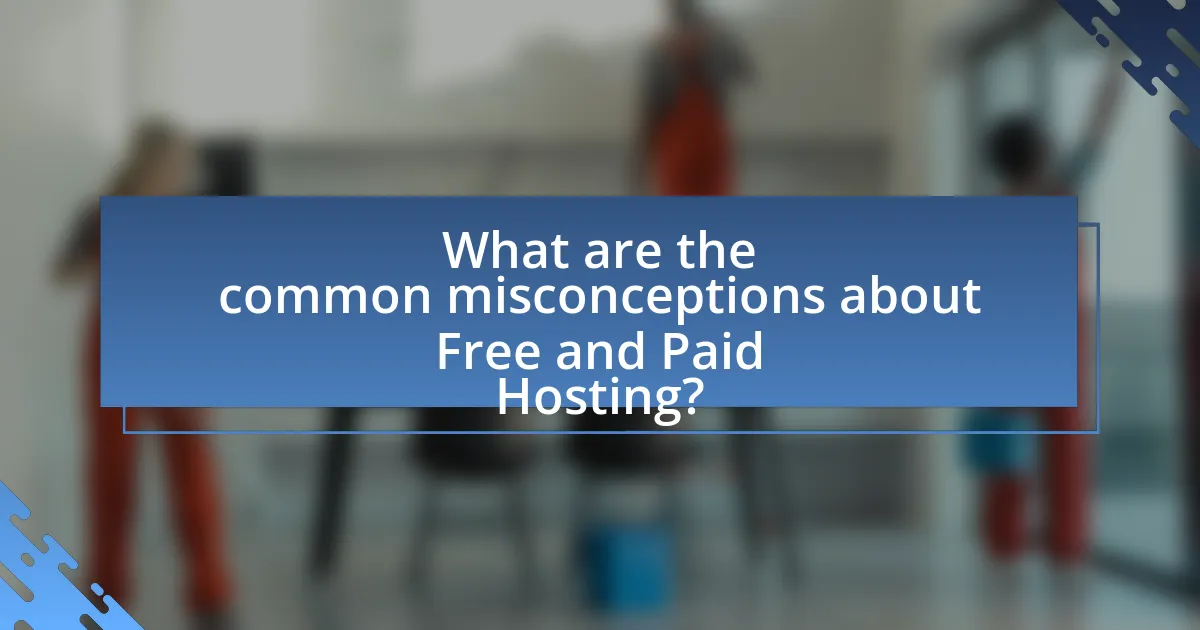The article examines the key differences between free web hosting and paid hosting, highlighting the limitations of free services, such as restricted resources, performance issues, and lack of customer support. It outlines the advantages of free hosting, including cost savings and user-friendly features, while emphasizing the benefits of paid hosting, such as enhanced security, reliability, and dedicated support. The discussion also covers user needs, the impact of website traffic on hosting choices, and common misconceptions about both hosting options. Additionally, it provides practical tips for selecting the right hosting solution and transitioning from free to paid hosting, ensuring users make informed decisions based on their specific requirements.

What are the key differences between Free Web Hosting and Paid Hosting?
Free web hosting typically offers limited resources, fewer features, and often includes advertisements, while paid hosting provides more storage, better performance, enhanced security, and customer support. Free hosting services may restrict bandwidth and domain options, whereas paid hosting allows for custom domains and greater flexibility in website management. According to a 2021 survey by HostingAdvice, 70% of users reported that paid hosting significantly improved their website’s speed and reliability compared to free options.
What are the advantages of Free Web Hosting?
Free web hosting offers several advantages, primarily cost savings, as it allows users to create and maintain a website without incurring any financial expenses. This is particularly beneficial for individuals, startups, or small businesses with limited budgets who want to establish an online presence. Additionally, free web hosting often includes user-friendly interfaces and basic features that simplify the website creation process, making it accessible for those with little technical expertise. Furthermore, many free hosting services provide essential tools such as website builders, templates, and customer support, which can enhance the user experience and facilitate website management.
How does Free Web Hosting impact website performance?
Free web hosting negatively impacts website performance by limiting resources such as bandwidth, storage, and server speed. These constraints often lead to slower loading times, increased downtime, and reduced reliability, which can deter visitors and affect search engine rankings. For instance, a study by Google found that 53% of mobile users abandon sites that take longer than three seconds to load, highlighting the importance of performance in user retention. Additionally, free hosting services may impose restrictions on the use of custom domains and SSL certificates, further compromising security and professionalism.
What limitations come with Free Web Hosting?
Free web hosting typically comes with several limitations, including restricted storage space, limited bandwidth, and lack of customer support. These constraints can hinder website performance and scalability, as many free hosting services impose caps on the amount of data that can be stored and transferred. Additionally, free web hosting often includes mandatory advertisements, which can detract from the user experience and brand image. Security features are also generally minimal, leaving websites vulnerable to attacks. According to a study by HostingAdvice, 70% of users reported dissatisfaction with the performance of free hosting services, highlighting the common issues associated with these platforms.
What are the benefits of Paid Hosting?
Paid hosting offers enhanced reliability, performance, and support compared to free hosting options. Users benefit from dedicated resources, which lead to faster loading times and improved website uptime, often exceeding 99.9%. Additionally, paid hosting typically includes advanced security features, such as SSL certificates and regular backups, which protect against data loss and cyber threats. Furthermore, paid hosting services provide customer support, often available 24/7, ensuring that technical issues can be resolved promptly. These advantages make paid hosting a more robust choice for businesses and individuals seeking a professional online presence.
How does Paid Hosting enhance website security?
Paid hosting enhances website security by providing dedicated resources and advanced security features that are often not available with free hosting. Paid hosting services typically include SSL certificates, which encrypt data transmitted between the user and the website, protecting sensitive information. Additionally, paid hosting often offers regular security updates, firewalls, and malware scanning, which help to prevent unauthorized access and attacks. According to a study by the Cybersecurity & Infrastructure Security Agency, websites with robust security measures are significantly less likely to be compromised, demonstrating the effectiveness of these enhanced security features in paid hosting environments.
What features are typically included in Paid Hosting plans?
Paid hosting plans typically include features such as increased storage space, enhanced security measures, dedicated customer support, and higher bandwidth limits. These features cater to the needs of businesses and individuals requiring reliable and scalable web hosting solutions. For instance, paid plans often provide SSL certificates for secure data transmission, regular backups to prevent data loss, and the ability to host multiple domains, which are essential for professional websites. Additionally, many paid hosting services offer performance optimizations, such as content delivery networks (CDNs) and caching solutions, to improve site speed and user experience.

How do user needs influence the choice between Free and Paid Hosting?
User needs significantly influence the choice between Free and Paid Hosting by determining the level of resources, support, and features required for their specific projects. For instance, users seeking basic website functionality may opt for free hosting due to its cost-effectiveness, while those needing advanced features like custom domains, enhanced security, and reliable customer support typically prefer paid hosting. Research indicates that 70% of small businesses prioritize uptime and support, which are often better with paid services, reinforcing the idea that user requirements directly correlate with hosting choices.
What types of websites are best suited for Free Hosting?
Websites that are best suited for free hosting typically include personal blogs, portfolios, small business sites, and hobbyist projects. These types of websites generally have lower resource demands and do not require extensive features or high traffic capabilities. For instance, personal blogs often focus on content sharing rather than monetization, making them ideal for free hosting platforms. Additionally, portfolios showcasing creative work can function effectively on free hosting, as they usually do not need advanced functionalities. Small business sites that are just starting out may also benefit from free hosting to minimize initial costs, provided they do not expect high traffic or require custom domain names.
How does website traffic affect the choice of hosting?
Website traffic significantly influences the choice of hosting by determining the required server resources and performance capabilities. High traffic websites necessitate robust hosting solutions, such as dedicated servers or VPS, to ensure fast loading times and reliability, while low traffic sites may function adequately on shared hosting plans. For instance, a website receiving thousands of daily visitors may experience slowdowns or downtime on a shared hosting plan, leading to potential loss of revenue and user trust. In contrast, a site with minimal traffic can operate efficiently on a free or low-cost hosting service, which typically offers limited resources. Therefore, understanding the expected traffic volume is crucial for selecting an appropriate hosting solution that aligns with performance needs and budget constraints.
What specific features do small businesses need from hosting?
Small businesses need reliable uptime, scalability, security features, customer support, and user-friendly interfaces from hosting services. Reliable uptime ensures that websites remain accessible, which is crucial for maintaining customer trust and engagement; studies show that even a minute of downtime can lead to significant revenue loss. Scalability allows businesses to adjust their hosting resources as they grow, accommodating increased traffic without service interruptions. Security features, such as SSL certificates and regular backups, protect sensitive customer data and comply with regulations. Responsive customer support is essential for resolving technical issues quickly, minimizing potential disruptions. Lastly, a user-friendly interface simplifies website management, enabling small business owners to focus on their core operations rather than technical complexities.
What factors should be considered when choosing Paid Hosting?
When choosing paid hosting, factors to consider include reliability, performance, customer support, pricing, and scalability. Reliability is crucial as it ensures minimal downtime; for instance, a hosting provider with a 99.9% uptime guarantee is preferable. Performance relates to speed and server response times, which can significantly affect user experience and SEO rankings. Customer support should be accessible and knowledgeable, ideally offering 24/7 assistance through multiple channels. Pricing should align with your budget while considering the features offered, such as storage and bandwidth limits. Lastly, scalability is important for future growth, allowing you to upgrade resources as your website traffic increases.
How important is customer support in Paid Hosting?
Customer support is crucial in paid hosting as it directly impacts user experience and service reliability. Effective customer support ensures that issues are resolved promptly, minimizing downtime and enhancing overall satisfaction. According to a survey by the HostingAdvice team, 70% of users consider responsive customer support a key factor when choosing a hosting provider, highlighting its significance in maintaining customer loyalty and trust.
What role does scalability play in hosting decisions?
Scalability is crucial in hosting decisions as it determines the ability of a hosting service to accommodate growth in website traffic and resource demands. A scalable hosting solution allows businesses to easily upgrade their resources, such as bandwidth and storage, without significant downtime or migration issues. For instance, cloud hosting services often provide on-demand resource allocation, enabling websites to handle traffic spikes efficiently. This adaptability is essential for businesses anticipating growth, as it ensures that performance remains stable and user experience is not compromised during peak times.

What are the common misconceptions about Free and Paid Hosting?
Common misconceptions about free and paid hosting include the belief that free hosting is sufficient for all website needs and that paid hosting guarantees superior performance without considering specific requirements. Many users assume that free hosting offers unlimited resources, while in reality, it often comes with limitations on bandwidth, storage, and support. Additionally, some believe that paid hosting is always expensive, but there are affordable options that provide essential features like better security and customer support. Research indicates that 60% of users experience performance issues with free hosting due to resource constraints, highlighting the importance of evaluating hosting needs against the limitations of free services.
Why do some users believe Free Hosting is sufficient for all needs?
Some users believe Free Hosting is sufficient for all needs because it offers basic services at no cost, making it appealing for personal projects or small websites. Many individuals perceive free hosting as adequate due to the absence of financial investment, which allows them to experiment with web presence without risk. Additionally, free hosting often includes essential features like website builders and limited storage, which can meet the requirements of casual users or those with minimal traffic. Statistics show that a significant percentage of small businesses and individuals start with free hosting options, as they prioritize cost savings over advanced features or reliability.
What are the risks associated with relying on Free Hosting?
Relying on free hosting poses several risks, including limited resources, lack of customer support, and potential security vulnerabilities. Free hosting services often impose restrictions on bandwidth and storage, which can lead to website downtime or slow performance during high traffic periods. Additionally, these services typically offer minimal technical support, making it difficult for users to resolve issues promptly. Security is another significant concern, as free hosting providers may not implement robust security measures, leaving websites vulnerable to hacking and data breaches. According to a study by the Cybersecurity & Infrastructure Security Agency, websites hosted on free platforms are more likely to experience security incidents due to inadequate protection.
How can users determine if Paid Hosting is worth the investment?
Users can determine if paid hosting is worth the investment by evaluating their specific needs against the features offered by paid hosting services. Key factors include reliability, customer support, performance, and scalability. For instance, paid hosting typically provides better uptime guarantees, often exceeding 99.9%, which is crucial for maintaining website accessibility. Additionally, paid hosting often includes enhanced security features, such as SSL certificates and regular backups, which are vital for protecting sensitive data. According to a study by HostingAdvice, 70% of users reported improved website performance after switching to paid hosting, indicating a significant return on investment for businesses that rely on their online presence.
What are the long-term benefits of investing in Paid Hosting?
Investing in paid hosting provides long-term benefits such as enhanced performance, improved security, and better customer support. Paid hosting services typically offer faster loading times and higher uptime rates, which are crucial for maintaining user engagement and search engine rankings. For instance, a study by Google indicates that a one-second delay in page load time can lead to a 20% decrease in conversions. Additionally, paid hosting often includes advanced security features like SSL certificates and regular backups, reducing the risk of data breaches and downtime. Furthermore, dedicated customer support is a hallmark of paid hosting, ensuring that technical issues are resolved promptly, which is vital for business continuity.
What practical tips can help users choose the right hosting option?
To choose the right hosting option, users should assess their specific needs, including website type, expected traffic, and budget. Evaluating the features offered by different hosting plans, such as storage, bandwidth, and customer support, is crucial. For instance, a website requiring high traffic may benefit from a dedicated server, while a personal blog might suffice with shared hosting. Additionally, users should consider the scalability of the hosting service to accommodate future growth. Research indicates that 70% of users prioritize uptime and reliability, making these factors essential in the decision-making process.
How can users evaluate their specific hosting needs?
Users can evaluate their specific hosting needs by assessing their website’s requirements, including traffic volume, storage space, and technical support. For instance, a website expecting high traffic will need a robust hosting plan with sufficient bandwidth, while a personal blog may require less storage and support. Additionally, users should consider the type of content they will host; dynamic websites often need more resources than static ones. According to a survey by HostingAdvice, 70% of users reported that understanding their website’s needs helped them choose the right hosting plan, highlighting the importance of this evaluation process.
What are the best practices for transitioning from Free to Paid Hosting?
The best practices for transitioning from free to paid hosting include evaluating your website’s needs, selecting a suitable hosting plan, backing up your data, and ensuring a seamless migration process. Evaluating your website’s needs involves assessing traffic levels, storage requirements, and specific features necessary for your operations. Selecting a suitable hosting plan should be based on these needs, considering factors like uptime guarantees and customer support. Backing up your data is crucial to prevent loss during the transition, and ensuring a seamless migration process involves testing the new environment before fully switching over to minimize downtime. These practices are supported by industry standards, which emphasize the importance of careful planning and execution in hosting transitions to maintain website performance and reliability.


